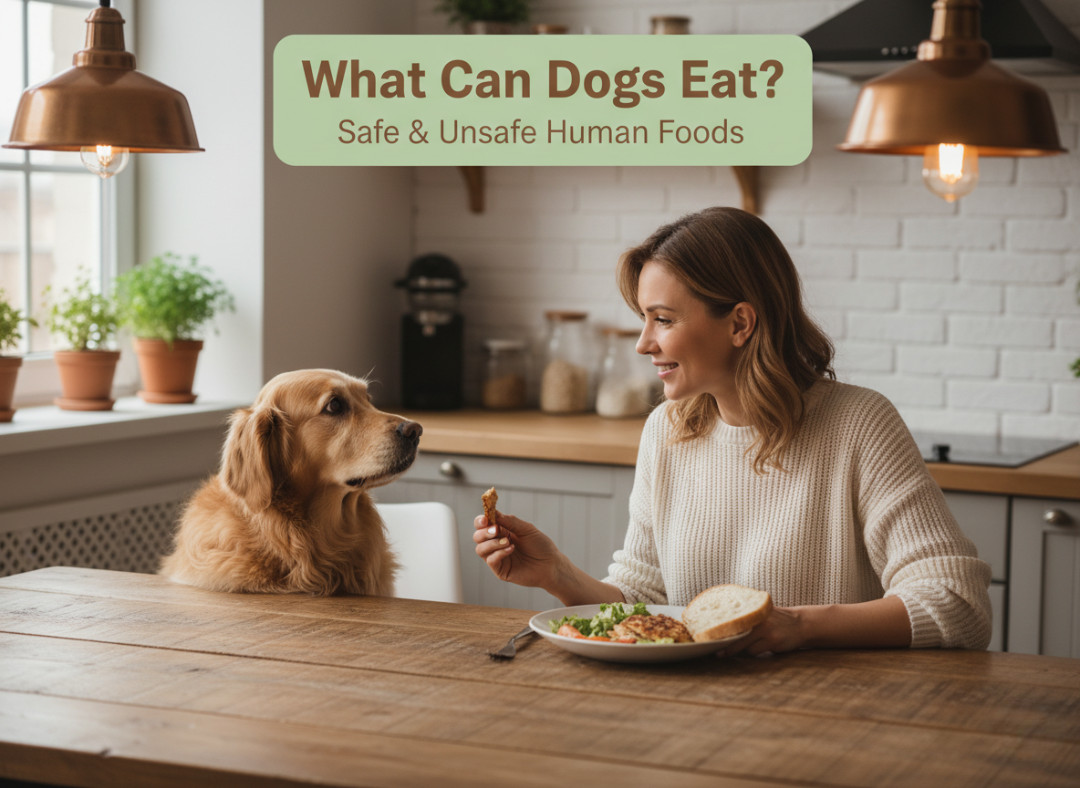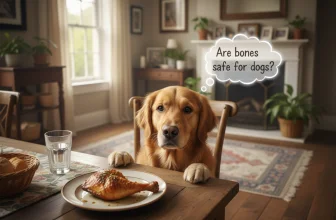What Can Dogs Eat? A Comprehensive Guide on Safe Human Foods for Dogs

You’re sitting at the dinner table, and your dog’s eyes are fixed on your plate. The pleading stare, the wagging tail it’s hard to resist sharing a bite. But before you give in, it’s important to know that not every human food is safe for dogs.
Some foods can be healthy and even beneficial, while others can be downright dangerous. This guide covers vet-approved safe foods, toxic ingredients to avoid, and expert insights to help you feed your dog safely and confidently.
1. Foods Dogs Should Never Eat
As a pet parent, it’s natural to want to share your favorite foods with your dog. But some human foods can be surprisingly dangerous, even in tiny amounts. What’s safe for us can cause serious digestive issues, organ damage, or even be life-threatening for dogs.
Veterinarians often see cases of accidental poisoning that could have been prevented with a little awareness. For example, a small piece of chocolate or a few grapes may seem harmless, but they can trigger toxic reactions within hours. Understanding which foods are unsafe helps you protect your dog’s health and avoid emergency vet visits.
Below is a list of the most common toxic foods every dog owner should know about and why they’re so harmful.

Toxic Foods for Dogs
- Onions, Garlic, and Chives – These can damage red blood cells and lead to anemia. Symptoms include weakness, vomiting, and pale gums.
- Chocolate – Contains theobromine, which can cause heart issues, tremors, or seizures.
- Grapes and Raisins – Can trigger sudden kidney failure, even a few can be deadly.
- Xylitol (Artificial Sweetener) – Common in sugar-free gum, peanut butter, and baked goods; causes a dangerous drop in blood sugar and liver failure.
- Avocado – Contains persin, which may cause vomiting and diarrhea in sensitive dogs.
- Alcohol and Caffeine – Both are toxic and can lead to rapid heart rate, tremors, and death.
Real Case Example
A 3-year-old Cocker Spaniel once ate a few onion rings left on a kitchen counter. Within hours, the dog became lethargic and started vomiting. A quick trip to the vet and prompt treatment saved its life.
Takeaway: Always keep these foods out of reach and never share table scraps that include these ingredients.
2.Can Dogs Eat Corn?
Yes, dogs can eat corn , but only in moderation.
Cooked corn kernels that are plain, unsalted, and free from butter or seasoning are generally safe for most dogs. Corn is a common ingredient in many commercial dog foods because it provides energy, fiber, and essential nutrients.
However, the way corn is served matters a lot. Never give your dog corn on the cob. Dogs may chew off large pieces, which can cause choking or serious intestinal blockages that require emergency surgery. Always remove the kernels from the cob before offering them.

Benefits of Corn for Dogs
Good Source of Carbohydrates:
Corn provides easily digestible carbs that help fuel your dog’s daily activities and keep them energetic.
Contains Dietary Fiber:
A moderate amount of fiber from corn supports healthy digestion and can help regulate bowel movements.
Packed with Nutrients:
Corn contains vitamins B and C, along with magnesium and antioxidants, which support overall health and immune function.
Adds Variety to Meals:
Small amounts of cooked corn can add texture and flavor to your dog’s regular food, making mealtime more enjoyable.
Potential Risks and When to Avoid Corn
Avoid Corn on the Cob:
Even small pieces can cause choking or intestinal obstruction.
Skip Butter, Salt, and Seasonings:
These can upset your dog’s stomach or raise sodium levels, which isn’t healthy for dogs.
Watch for Grain Allergies:
Some dogs are sensitive to grains like corn. Signs of a food allergy include itchy skin, ear infections, or digestive issues. If you notice any of these symptoms, stop feeding corn and talk to your vet.
Expert Tip
Corn is fine as an occasional snack or a small mix-in to your dog’s regular diet, but it should never replace balanced, complete dog food. A few spoonfuls of plain cooked kernels are enough for most dogs.
If you’re unsure whether corn fits your dog’s specific diet especially. If they have allergies or sensitivities. Always check with your veterinarian first.
Read More: Full Guide on Can Dogs Eat Corn
3. Can Dogs Eat Salmon?
Absolutely cooked salmon is one of the best human foods you can share with your dog.
Health Benefits:
- Packed with omega-3 fatty acids, which promote a shiny coat, healthy skin, and joint flexibility
- Supports brain and heart health
Feeding Guidelines
- Always serve cooked salmon. Raw or undercooked fish can contain parasites like Neorickettsia helminthoeca, which cause salmon poisoning disease.
- Remove all bones to prevent choking.
Case Example:
A Golden Retriever with a dull coat started eating small servings of cooked salmon twice a week. Within two months, the owner noticed a shinier coat and less shedding.
Read More: Full Guide on Can Dogs Eat Salmon
4. What Kind of Yogurt Can Dogs Eat?

Yogurt can be a healthy and tasty treat when chosen correctly.
Safe Yogurt Options:
- Plain, unsweetened yogurt – gentle on the stomach
- Greek yogurt – high in protein and probiotics
Avoid flavored or sweetened yogurts that contain xylitol, sugar, or artificial additives.
Health Benefits:
- Probiotics promote good gut bacteria
- Supports digestion and reduces gas
- May help dogs with mild digestive sensitivity
Read More: Full Guide on What Kind of Yogurt Can Dogs Eat
5. Safe Fruits and Vegetables for Dogs
Many fruits and veggies are excellent snacks and nutritional boosters for dogs.
Dog-Safe Fruits
- Apples (remove seeds and core) – good source of fiber and vitamin C
- Blueberries – antioxidant-rich superfood
- Strawberries – natural sweetness and vitamin C
- Watermelon – hydrating and low-calorie treat
- Bananas – potassium-rich but should be given in moderation
Dog-Safe Vegetables
- Carrots – crunchy, low-calorie dental chew
- Green Beans – full of fiber and vitamins
- Cucumbers – hydrating snack
- Pumpkin – supports digestion and helps with constipation
- Broccoli – safe in small portions, helps boost immunity
Expert Insight:
“Fruits and veggies make great training treats. They’re low in calories and full of nutrients. Always cut them into bite-sized pieces and avoid anything toxic like grapes or onions.” — Dr. Emily Stone, DVM
Case Example:
A Beagle prone to weight gain switched from store-bought treats to carrot and apple slices. In 3 months, she maintained a healthy weight and enjoyed her crunchy snacks guilt-free.
6. Seasonings and Herbs Dogs Can Eat
While dogs don’t need seasonings, some herbs can offer health benefits.
Safe Herbs:
- Parsley – freshens breath and aids digestion
- Basil – has anti-inflammatory properties
- Turmeric – natural anti-inflammatory
- Oregano – contains antioxidants and supports immune health
Avoid:
Salt, garlic powder, onion powder, chili, nutmeg, and spicy seasonings—they can irritate your dog’s stomach or cause toxicity.
Practical Tip:
When cooking for your dog, keep it simple. Lightly season meals with dog-safe herbs only.
7. Tips for Feeding Human Foods to Dogs
To safely share your food with your dog, keep these rules in mind:
- Introduce new foods slowly – sudden diet changes can upset your dog’s stomach.
- Offer small portions first – observe for allergies or reactions.
- Avoid fatty, sugary, or spicy foods.
- Always consult your vet if your dog has existing health issues or food sensitivities.
- Stick to moderation – human foods should complement, not replace, a balanced dog diet.
Expert Perspective
“Many human foods are safe and beneficial for dogs, but owners must know which foods are toxic. Introducing safe fruits, vegetables, and cooked proteins enriches a dog’s diet while avoiding serious health risks.”
— Dr. Karen Becker, Holistic Veterinarian
Final Thoughts
Sharing food with your dog can be a great way to bond but safety comes first. Stick with plain, natural, and dog-safe options like cooked salmon, carrots, apples, and plain yogurt. Avoid anything with chocolate, onions, or artificial sweeteners.
Remember, your dog’s diet should be primarily made up of balanced commercial or vet-approved dog food, with human foods served as occasional treats.
Your dog trusts you with their health, so every bite counts.
- Related Reads:
Frequently Asked Questions (FAQs)
1. What human foods are safe for dogs?
Dogs can safely eat plain, cooked meats like chicken or salmon, as well as fruits and veggies like apples, carrots, green beans, blueberries, and pumpkin. Always avoid seasonings, sauces, and processed foods.
2. What fruits can dogs not eat?
Avoid grapes, raisins, cherries, and avocados. These can cause digestive issues or even organ failure in dogs.
3. Can dogs eat rice or eggs?
Yes. Both rice and cooked eggs are safe and easy to digest. They’re great for dogs recovering from upset stomachs.
4. How often can I give my dog human food?
Human foods should make up less than 10% of your dog’s daily calories. Always introduce new foods gradually and watch for allergic reactions.
5. Can dogs eat peanut butter?
Yes,if it’s xylitol-free and unsalted. Peanut butter makes a tasty, protein-rich treat for dogs when given in moderation.
6. Is cheese okay for dogs?
Small amounts of plain cheese (like mozzarella or cottage cheese) are fine for most dogs. However, some are lactose intolerant, so start with small bites and observe.
7. What should I do if my dog eats something toxic?
Contact your veterinarian or the ASPCA Animal Poison Control Center (888-426-4435) immediately. Do not try to induce vomiting without professional advice.
Conclusion: Feed With Love, But Feed Smart
Sharing your food with your dog can be a sweet way to show love—but it’s also a big responsibility. A few bites of cooked salmon, some crunchy carrots, or a spoon of plain yogurt can make your dog happy and healthy. But remember, not every human food is safe.
When in doubt, always check with your vet before introducing new foods. Every dog is different, and what’s safe for one might not be for another.
Feeding safe human foods in moderation can add variety and nutrition to your dog’s diet. Just keep it simple, natural, and vet approved.







